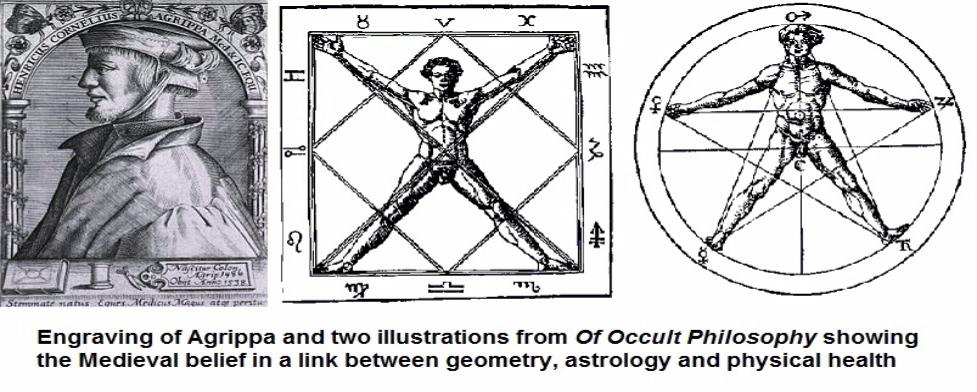THE MAGICIAN WHO RENOUNCED MAGIC – THE EXTRAORDINARY CAREER OF CORNELIUS AGRIPPA
In April 1510 Cornelius Agrippa, a 24 year old student at the University of Wurzburg, presented his three volume thesis on ritual magic to his tutor Johannes Trithemius. However, the learned professor advised his pupil to keep his work secret lest they both fall victim to the dreaded Holy Inquisition. Agrippa duly took Trithemius’ advice and, for the next twenty one years, his monumental book remained unpublished.
Agrippa’s “Of Occult Philosophy” was eventually printed in 1531 but, in the intervening two decades, the now famous alchemist, theologian, lawyer, soldier and physician seems to have had a change of heart. Even as the printers were setting the type, Agrippa insisted that the revised version of his great work included this postscript declaring that he no longer believed in magic:
“But of magic I wrote whilst I was very young three large books, which I called Of Occult Philosophy, in which what was then through the curiosity of my youth erroneous, I now being more advised, am willing to have retracted, by this recantation; I formerly spent much time and costs in these vanities. At last I grew so wise as to be able to dissuade others from this destruction.”
Scholars are divided on Agrippa’s motives for making such a statement but it seems that it was not motivated by fear. As Agrippa was living in the Protestant city of Grenoble at this time, he was beyond the reach of the Catholic Church and he even repeated his repudiation of magic in his final pamphlet, entitled “Complaints against the Calumnies of Monks & Schoolmen”:
“As for my magic I have done many wonderful things but none that offend God or hurt religion… Many things are done by the powers of Nature which ignorance or malice will attribute to the demons rather than to Nature or God…”
Despite this rejection, Agrippa’s works influenced later magicians and natural philosophers such as Giordano Bruno and John Dee so who was the magician who renounced magic?
Heinrich Cornelius Agrippa von Nettesheim was born in Cologne in 1486 and in 1499 he enrolled in the city’s university to study theology. From the start of his academic career, Agrippa enjoyed baiting orthodox thinkers and whilst at Cologne he followed the teachings of Albertus Magnus rather than the more generally accepted theology of Thomas Aquinas. Later he moved to Paris, where he joined a secret occult society, but by 1508 he was serving in the Holy Roman Emperor’s army.
Agrippa fought in Spain, Italy and France and though his military career was short he managed to win both a knighthood and the patronage of the emperor’s daughter, Margaret of Austria. Thanks to Margaret, who governed Franche-Comte on behalf of her imperial father, Agrippa became a professor at the University of Dole in 1509 and here he wrote “On the Nobility &Excellence of the Feminine Sex” as a tribute to his patron.
This extraordinary work argues that women were superior to men when it came to understanding the Cabala (the Christianised version of Judaism’s mystic texts whose most famous modern adherent is, ironically, Madonna) and it’s hardly surprising that these views attracted serious criticism from Agrippa’s orthodox male colleagues. After being branded a ‘Judaising heretic’ by his jealous rivals, Agrippa left Dole and fled to Wurzburg to study with the aforementioned Trithemius. Agrippa also visited England, where he wrote a riposte to his critics in which he declared: “I’m a Christian but I don’t dislike Jewish rabbis”.
In 1511 Agrippa travelled to Italy to study theology and law and by 1515 he was lecturing at the University of Pavia. In 1518 he moved to Metz to take up the legal post of syndic (public defender) and in this capacity he secured the acquittal of a man accused of heresy and a woman accused of witchcraft. Unfortunately his successful defence of these ‘incorrigible sinners’ made him even more enemies, including the powerful inquisitor Nicholas Savin, and he was forced to resign.
After moving back to Cologne for a short while, Agrippa spent several years studying medicine in Geneva before becoming personal physician to Louise of Savoy, mother of the French king Francis. This seems to have been the high watermark of Agrippa’s career because, besides ministering to the French queen, he was asked to give a legal opinion on the divorce of Henry VIII and Catherine of Aragon.
Perhaps wisely, Agrippa declined to become embroiled in the English King’s ‘Great Matter’ and he returned to Germany to become archivist to Holy Roman Emperor Charles V. Unfortunately this move seemed to mark a change in Agrippa’s fortunes. Within a year he’d been arrested for debt and imprisoned on a spurious charge of insulting the French Queen Mother. Yet, once again, Agrippa managed to outwit his enemies and he fled to Grenoble where he spent a comfortable retirement with his third wife and numerous children.
Though his books and pamphlets continued to attract the ire of the Catholic Church, the Inquisition had no power in Grenoble and Agrippa died of natural causes sometime between 1535 and 1538. Moreover, whatever Agrippa’s true beliefs, his writings are still studied by academics today because his attempts to synthesise the principles of magic, natural philosophy and Christianity, offer a unique insight into the mind of a medieval man searching for a door into the modern world.

